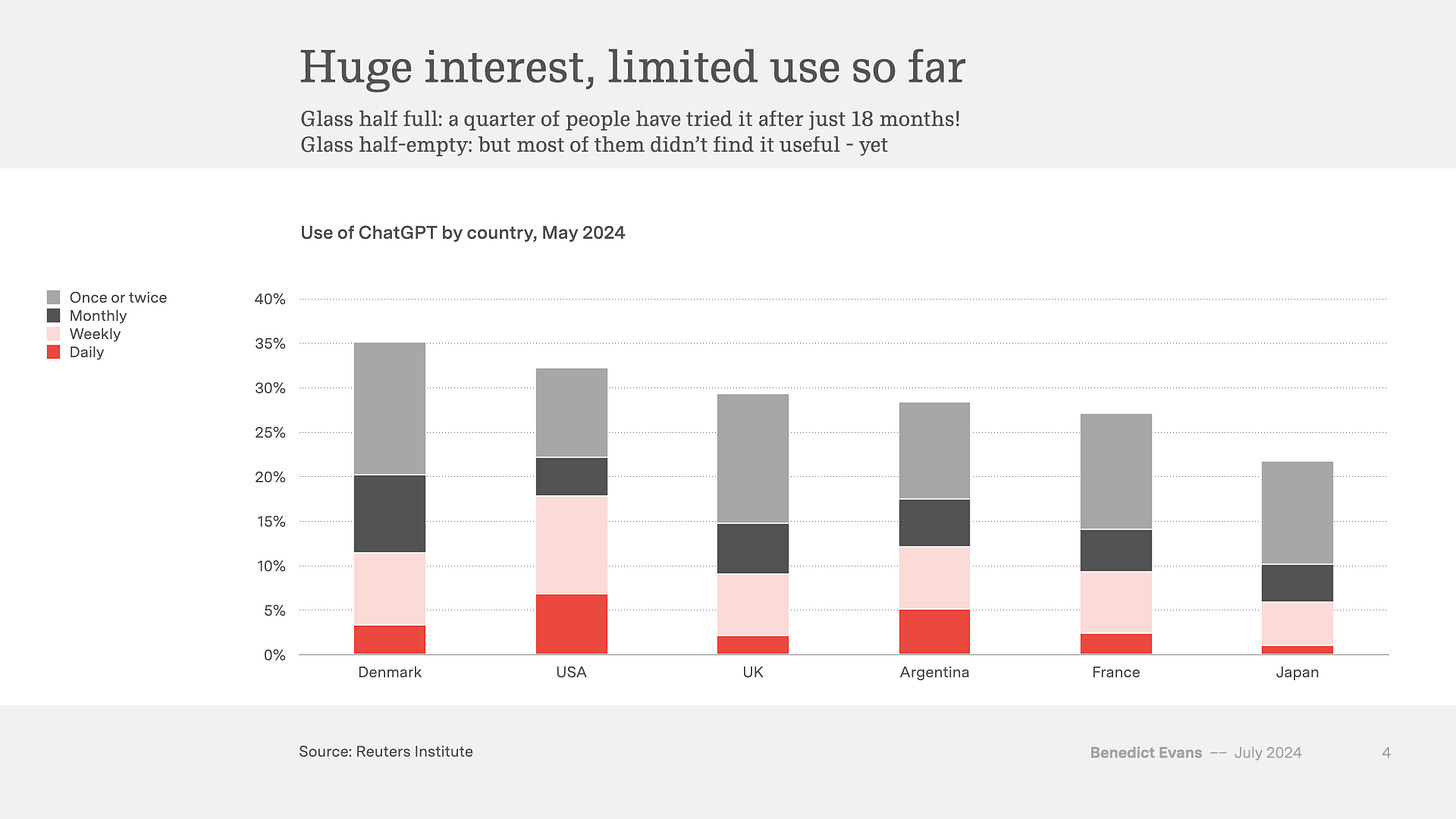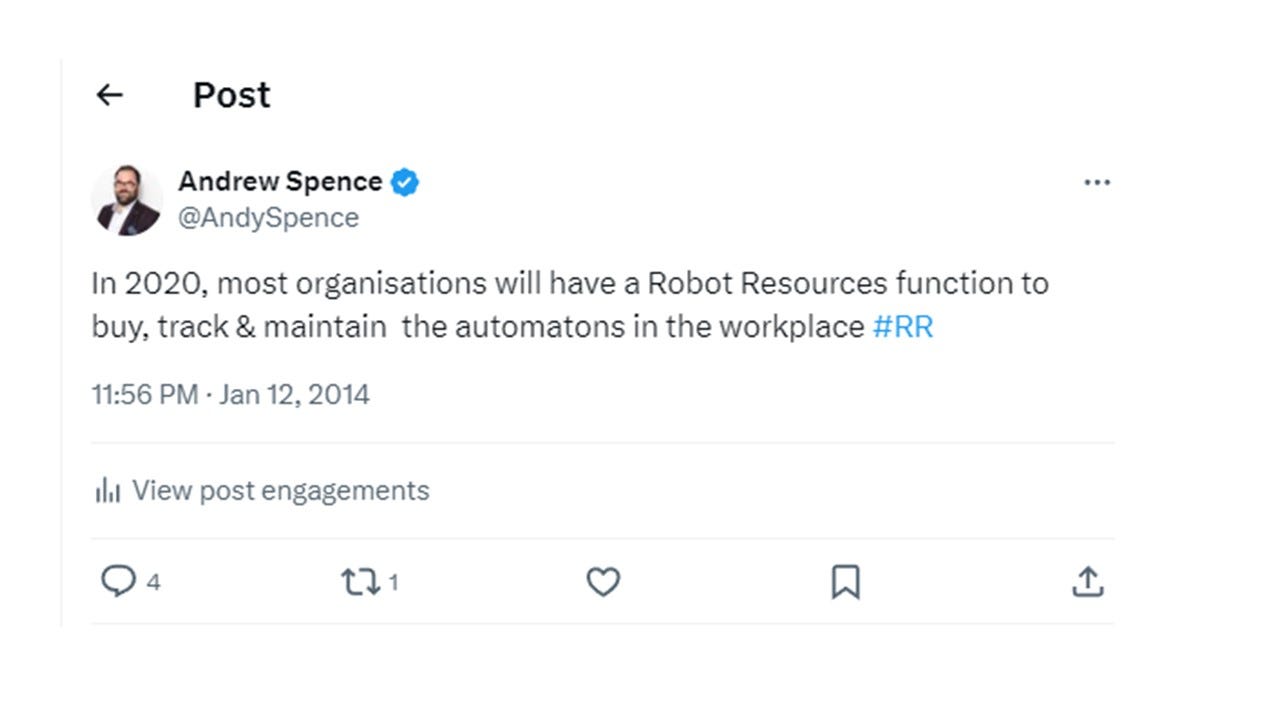From Human to Robot Resources: Are We Entering the AI Summer of Love?
Big Announcement: Work3 Collaboration and the Launch of A New Weekly Series with Insights on Latest Work Trends
Exciting News!
The future of work is a collaborative journey, and I am thrilled to announce that Matteo Cellini from the Work3 Newsletter and I are joining forces to create an even better and more impactful publication.
Our joint community now reaches over 22,000 subscribers including CHROs, CEOs, Journalists, Analysts, Academics, Solopreneurs, and leaders from over 120 countries!
I am incredibly excited about this 🎉 for two reasons:
✏️ Matteo is not only an exceptional writer, but also makes decisions on the future of work with his day job. He has worked as Head of Digital Marketing at consulting firms and top brands like Yahoo! and Expedia.
📬 Joining efforts will allow us to publish better articles by working together on research and writing. We also have plans to roll-out a podcast, community events, and offer subscribers opportunities to try out the latest technology we love.
What to Expect
Weekly insights, curated research, feature articles, and interviews on the future of work
NEW Product launches and community initiatives on the horizon…
How you can Get Involved
Already subscribed to one of our newsletters? Sit back and enjoy!
Interested in partnering or sponsoring? Lets Talk.
Have a story, insight, new product to share? We’d be eager to feature it in upcoming issues
We seek collaborators, agitators and partners to build new products and services for the community.
Please help us spread the word by sharing with friends and colleagues - your support is crucial for us 🙏🏻
In the first of our weekly work trend updates, we ask :-
Are we in the AI Summer of Love?
Can AI transform a large government department and,
Is HR about to become RR – Robot Resources?
1 - The AI Summer of Love?
ChatGPT is useful and can be fun - for example, converting your WhatsApp group messages to the ‘Downton Abbey style’.
However, hundreds of millions have tried it once, but not returned.
In his article ‘The AI Summer’, Benedict Evans makes a couple of observations about LLMs (Large Language Models) like ChatGPT. He argues that LLMs look like ‘ready-made products’ – partly because of the reassuring natural language interface. However building products that sell is much harder work involving the right marketing, bundled offerings, user interface etc.
It doesn’t mean that LLMs are not being used, they are, but the adoption story will be mixed. Looking back, it turns out that ‘the future’ can take longer than we think. For example,
It took 20 years for 20% of US Retail to move online.
Only 5.4 million iPhones were sold in the first 12 months after launch.
Evans gives the example of consulting and tech firms making dubious claims to piggyback on Peak AI. He makes the argument that the adoption of LLMs might follow a different path to the previous hyped technology.
In the world of work, I think LLMs accelerate the existing and longer-term mega trends - for example, increasing the proportion of people working in non-traditional forms of employment. More by doing tasks quicker and more cheaply than creating the next killer product.
Watch this space for more exploration of Peak AI in the coming weeks to see whether AI will fizzle out like Hippy hair-styles, or be a game-changer.
Read the full article here.
Poll - Are We In the AI Summer of Love?
2 - Can AI Transform a Large Government Department?
The UK’s Department for Work and Pensions (DWP) is the largest public service department in the country and responsible for administering welfare and pensions to 20 million citizens.
DWP employs nearly 90,000 people and costs more than £240 billion ($308 billion) to run every year.
Like most business functions, someone has been tasked with looking at AI opportunities. According to the DWP Director of AI,
“AI will allow us to create a more human service that cares better for the vulnerable, provides colleagues with more rewarding jobs and takes the pressure off public finances so money can be spent where it matters most.”
A research paper indicated that the DWP workforce could free up as much as 40% of its time using AI tools. This is equivalent to a productivity gain of close to £1 billion a year. They could reduce backlogs for paying citizens and introduce chatbots to help people find the right job or training.
The challenge here will not be the delivery of AI technology – which is mostly an extension of data processing, statistics, natural language and algorithms. The challenge is delivering organisational change - how people work, the processes, the culture - which in my experience is much more complex than implementing new technology.
Curiously, DWP has issued guidelines formally prohibiting employees from using ChatGPT. On the one hand, it has ambitions to use technology to improve its organisation, on the other hand, it doesn’t empower its own workforce to innovate - which is where the most promising ideas usually come from, not from external consultancies.
This is a reminder that the success of new technology implementation is very much integrated into the organisational context.
There are loads of compelling AI ideas in this type of proposal with tempting examples from around the world. However, we need to be sceptical of productivity gains “from AI” and learn from previous technology innovation attempts in the context of these organisations.
You can read the research paper, here.
3 – From Human To Robot Resources 🤖- AI Agents as Co-Workers
The debate about integrating AI into the workforce reached a boiling point recently when HR software company Lattice proposed giving AI agents official employee status. The idea was to fully integrate these digital workers into the company’s organisational structure, complete with onboarding, performance metrics, and even managerial oversight.
On first glance this looks like yet another case of AI anthropomorphism – the tendency to view inanimate things with human characteristics.
We humans can see a shovel doing work and know it’s a tool, but if we put a cute face and name to an app with software and data behind it skews our thinking.
And our AI engineers do like to put a human face on our technology, usually a woman’s face.
With names like Eva, Vera, Jane, Olivia, Ally, Mya - so it only seems fair to give these helpers employment rights like us right?
The organisational context comes from a profession named ‘Human Resources’ which linguistically anyway, deems people as resources to be utilised, like erm shovels.
Anyway, the bold move from Work Tech company Lattice was retracted after facing significant backlash from HR professionals and industry experts. Lattice made a mistake, but this does pick up on a challenge as HR evolves into its role of ‘work designers’ rather than workforce process managers.
Organisations need to design work and use the best resource available whether that is from existing staff, agencies, or automated solutions. We now have many more options beyond filling vacancies. From freelancers to agencies to robots, DAOs and automation opportunities are growing exponentially. I think we need a major shift in mindset and capabilities from managing employees to designing work in its broadest sense.
Our current Work Technology stack is poorly equipped to support this move as it is mainly 30 year software architecture built on top of 20th century management processes.
Do we currently have the right work infrastructure to manage this? Absolutely not!
But we have a significant opportunity to shape this area and help make work better for more people...
Finally, the thought of Human Resources expanding to include Robots🤖is not a new one!
We’d love to hear your thoughts – let us know in the comments.
Watching the work horizon,
Andy






We are at the peak when it comes to evaluations but we still are early when it comes to adoption.
This was such a good read. Thank you.
Your sentence "Our current Work Technology stack is poorly equipped to support this move as it is mainly 30 year software architecture built on top of 20th century management processes" brilliantly sums up where we are starting from.
The DWP wanting users to experience and benefit from AI whilst denying it to employees says it all!